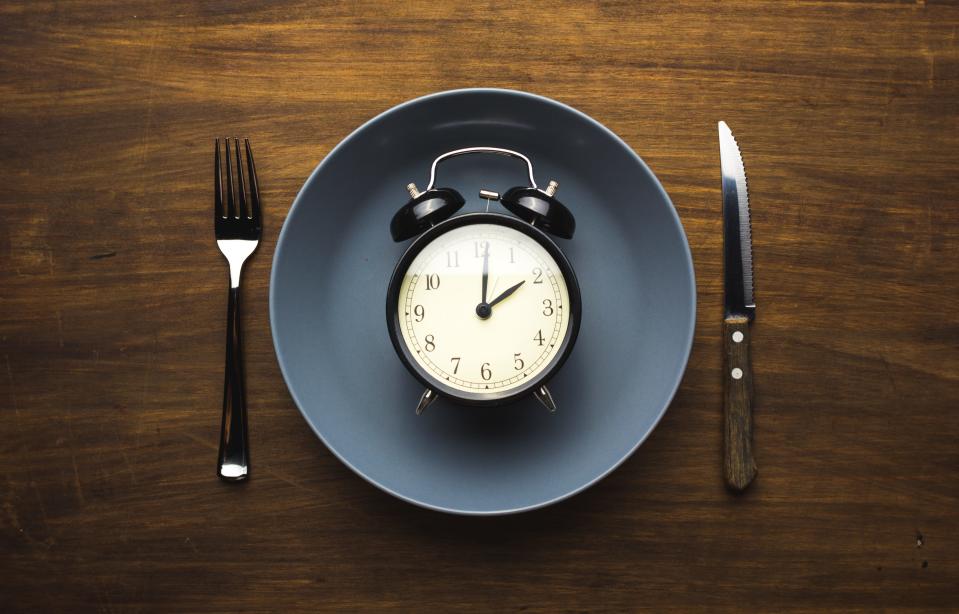Intermittent fasting isn't for everyone | Ervolino
For the last few days, I’ve been looking into all this intermittent fasting stuff.
Why? Well, according to my doctor, I am now 218 pounds — which is 10 pounds more than I was last year and 40 pounds more than I was in 2019.
What does this mean?
Well, among other things, it means that by 2087, I will be (roughly) 858 pounds.
It also means that I should probably go on a diet.
Or, something like that.
In case you’re interested, I have NEVER been on a diet. And to be honest, I don’t really like the sound of any of the popular ones out there.
The cabbage diet? The grapefruit diet? Atkins? Keto? The Whole30? The Paleo?

For that last one, you are only supposed to eat what people ate in the Paleolithic Era, which basically limits you to nuts, roots, dinosaurs and fossilized mosquitoes.
(For additional Paleo dining suggestions, consult “Eat for Life” and “Practical Paleo.” You might also try watching a few episodes of “The Flintstones.”)
Sensing how upset I was about yet another shocking 10-pound gain, my doctor tried to be kind.
He even handed me a Kleenex as I sobbed and banged my head against the wall.
“So I’m morbidly obese now,” I howled, sniffling. “That IS what you call it, isn’t it?”
“I don’t believe in labels,” he replied, “because they just screw up your head. Essentially, you’re not exercising like you used to, you’re older, and you’re bored. And you run around the kitchen eating whatever you can find.”
“So what you’re basically telling me,” I said, “sniffle, sniffle, is that I’m a lonely, sedentary, endomorphic cockroach?”
“That sounds terrible,” he replied. “But, yes, that’s what you are. Have you considered portion control?”
Actually, that is probably my biggest problem: portions.
Ervolino: Everything we love, and hate, about medical portals
More Ervolino: Do you have the temperament to hold a garage sale?
When you come right down to it, I’ve been on what they now call “the Mediterranean diet” for my entire life: chicken, fish, olive oil, lots of fruits and vegetables, nothing processed …
I only eat healthy foods!
But, as my doc observed: “You’re eating too much of them.”
I didn’t have this problem when I was younger. I could eat a pound of spaghetti and still keep my boyish 29-inch waist.

Sadly, though, times have changed. Even in restaurants. The last time I went to a really good Italian restaurant in Manhattan and ordered linguine with clam sauce, my waiter brought me a little twirl of pasta with three clams the size of nickels.
I know these baby portions are supposed to be good for you, but they make me sad.
If God wanted us to eat such minuscule portions, why did he make such enormous spaghetti bowls?
Apparently, this is where intermittent fasting comes in. This diet concentrates less on what you’re eating and focuses on when you eat it.
Exponents of the diet believe you will lose weight if you eat only during a specific eight-hour window and fast for the other 16.
They also favor a 5:2 plan, in which you eat regularly for five days and fast for two.
According to the folks at Johns Hopkins, during the times when you are eating, the Mediterranean diet provides a good blueprint.
During your non-eating hours, you can’t have any food, but you can drink all the water you want. Coffee and tea are also acceptable, as long as you don’t sabotage them with cream and sugar.
Various studies have shown that eating this way can help you lose weight, lower blood pressure, prevent Type 2 diabetes and slow the aging process.
Studies have also shown that it can improve your memory.
So when you’re up at midnight, gorging yourself on a thick, juicy bottle of Poland Spring, you can remember all the way back to 7:30 p.m., when you ate your last morsel for the day.
You can also remember every pork chop you’ve ever eaten and the homemade ravioli your mom made when you were a kid.
“Billy, have a few more ravioli.”
“Ma, I can’t. I’m stuffed.”
“Don’t be silly. Look at you! You’re skinny as a rail!”
Other studies have shown that mice who were fed every other day showed greater endurance in running.
(Every night at around 11:30, they would break out of the lab and run as fast as they could to the Dumpster behind McDonald's.)
Intermittent fasting — also known as IF — isn’t for everyone. It’s certainly not for women who are pregnant or breastfeeding. Or anyone with a history of eating disorders.
As for me …
Can I go 16 hours a day without eating anything? Will I look better? Feel better?
Can I go back to Goodwill and reclaim all the clothes I donated?
GUARD: “Bring back those clothes!”
ME: “No! They’re mine! I’m skinny again! And I can run fast!”
No waist. And haste.
That’s my dream.
This article originally appeared on NorthJersey.com: Bill Ervolino wants to lose weight. Could intermittent fasting work?

